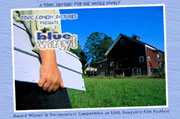Not quite the light side
Not quite the light side

This film, produced by Toxic Comedy Pictures, captures the directors and crew of this independent film travelling to America's vinyl manufacturing capital and beyond in search of answers to troubling questions about the nature of polyvinyl chloride (PVC).
Armed with two environmentalists from Greenpeace, Helfand visits her parents' vinyl-sided home in Long Island. She encounters Billy Bagget - an independent lawyer in Louisiana, who has spent the last decade piecing together a conspiracy case against 29 of the largest PVC-producing chemical companies in the world. The film, infact, is full of memorable characters, caught in the high drama that the director weaves into the plot.
From Bagget's office in Lake Charles, Louisiana, the film travels to Venice, Italy, where many executives from a PVC-producing company are in the midst of a trial, personally accused of manslaughter in the deaths of their employees and polluting the Venice Lagoon. (All of whom were subsequently acquitted.) Neither irony, nor humour spared there!
This juxtaposing of real life characters laced with black humour is what sets Blue Vinyl apart. The balance of humour and horror, facts and anecdotes, and the face-off between cynicism and hope is beautifully managed. The film reveals a complex web of alleged corporate conspiracies, and their characteristic insensitivity to the tragic loss of human life due to chemical exposure.
On a less philosophical, and more practical and sober note, Helfand squarely looks in the face questions of product safety and their life cycles, as also the human face of this issue. She portrays how difficult it is to convince her parents to take the vinyl off their modest house. The personal journey, and its interplay with a larger consciousnes is one of the most charming features of this film.
The film's humour does not steer clear from its mission for environmental health and justice. Interes-tingly, this juxtaposes the film quite comfortably between the worlds of entertainment and corporate accou-ntability. The result is a uniquely personal exploration of the relationship between the consumers and the industry in a gripping feature-length documentary.
Blue Vinyl won the documentary competition at the 2002 Sundance Film Festival.







